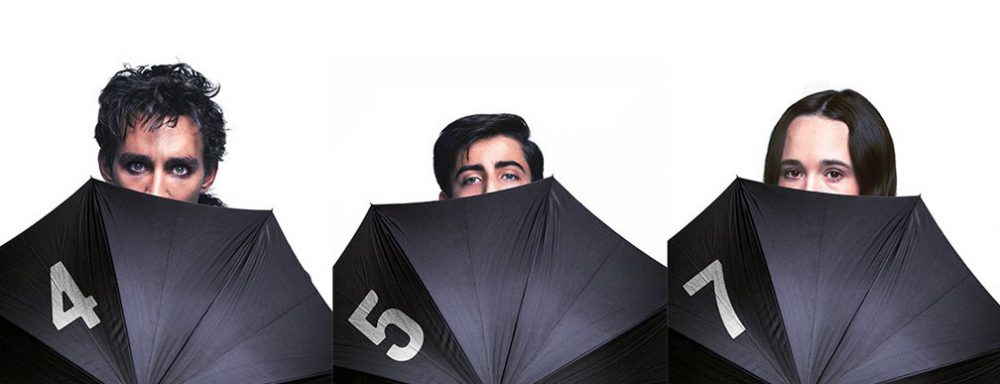Among the seemingly large clutter of superhero movies in the modern age of cinema and television consumption, ‘The Umbrella Academy’ is in more ways than one, a breath of fresh air, and in more ways than that, strangely reminiscent of more than a few well renowned superhero arcs you have seen translated on-screen before. Think X-Men, which is also evidently the most obvious comparison, with the impressive visual character of ‘Watchmen’ sans the dark tone, and a hint of the violence from ‘Kick Ass’ peppered with generous bouts of situational humour and clever dialogue. The final outcome, a ten episode long superhero TV series about seven sibling misfits with dysfunctional relationships who are brought together due to the death of their adoptive father in a bid to prevent an impending apocalypse, is both a gleefully original product at once owing to its treatment and style, a majorly entertaining one at that, and a vastly familiar narrative with a plethora of familial tensions and resolutions to add stakes to the proceedings.
However, let me assure you that despite the occasional familiar tracks the show appears to be headed in, it’s a sufficiently thought of, well crafted out and polished end product to warrant your attention over its entire run of ten one-hour long episodes. I am appalled at the fact that I had never picked up a comic book with the same title before watching the show, given the immense credibility of Dark Horse comics, and as I move to correct that, we take you through the rather sudden and ambiguous ending of the show. Needless to say, if you are here, you have seen the show and know what the plot is about, but a spoiler alert about the show and the original comics becomes imperative. Read on.
The Finale: The White Violin
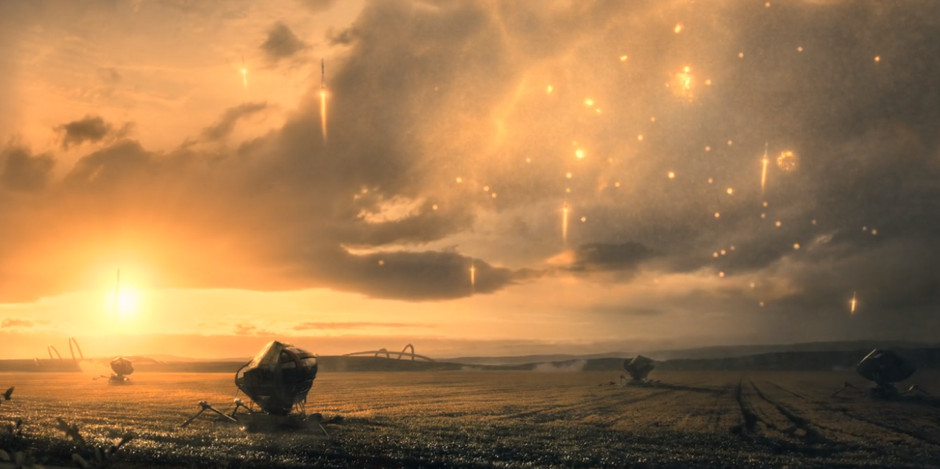
Without rewinding too much, we stop the clocks at the beginning of the final episode of the first season. The finale, aptly titled ‘The White Violin’, after the name of Vanya’s destructive alter ego from the comics, begins with a bit of history on the eccentric billionaire recluse, Sir Reginald Hargreeves, nicknamed ‘The Monocle’ in the comics. He is shown as his younger self “long ago”, caring for an ailing loved one, presumably his wife and the original owner of the violin now possessed by Vanya. “Find someone who will love it as much as I have,” she says. An interesting aspect of this scene is that it reveals the location to be anything but Planet Earth, confirming The Monocle’s alien roots according to the comics, as he stares out the window upon the passing of his loved on, numerous rockets leave the dying world and he releases tiny magical pixie like particles from a jar, presumably responsible for the pregnancy of the 43 women that gave birth on the fateful day of 1st October 1989. We later see him arrive in the present world in the show, where he immediately buys a space let out by an umbrella manufacturer, and makes it his home: the same home that would later become the grounds for the Umbrella Academy.
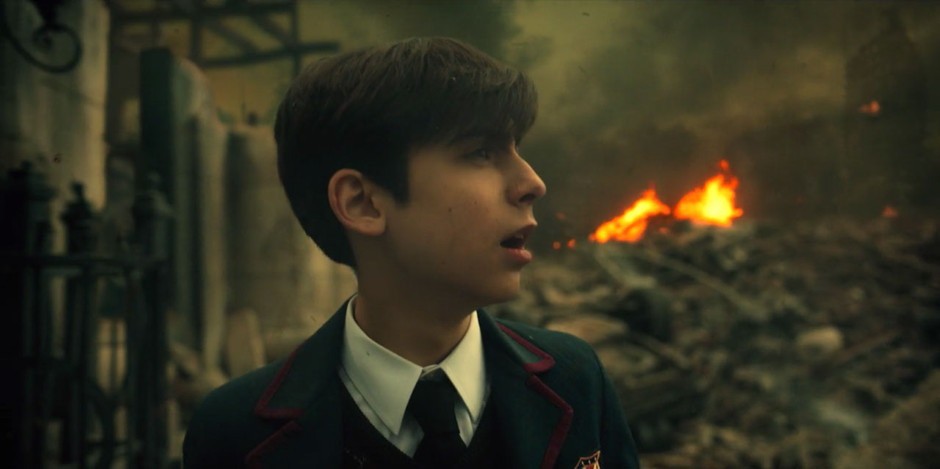
Back in the present day, Vanya (from the previous episode) is shown to have given in to her darker side as a result of being trapped in the underground bunker by Luther, her rage and despair becoming reasons for her power to manifest, and overcome her incarceration. Vanya, now completely overcome by her malevolent side begins destroying the Academy in rage, killing Pogo upon learning that he’d known the truth about the existence of her powers from the beginning. As the building collapses, the siblings are able to escape but Grace is destroyed with it.
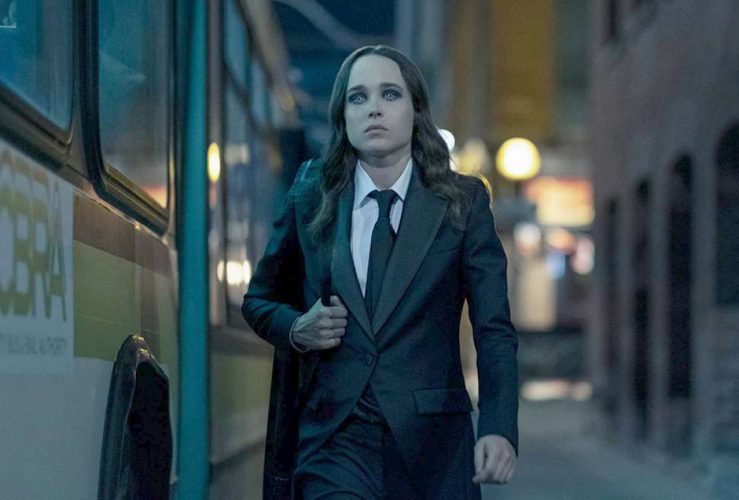
The group reconvenes at a nearby bowling alley, while Five goes off to meet the reincarnated Handler upon her behest, who has now tasked Hazel and Cha-Cha with ensuring the safety of Vanya, so that the apocalypse could take place as was predicted. He discovers that the meeting was a setup only meant to distract him. While at the bowling alley, the remainder of the Umbrella Academy deduce to find Vanya at the Icarus theatre where she was to perform as first, and stop her by any means necessary, as they are attacked by heavily armed assailants from a special division at the Temporal Agency. Meanwhile, Hazel betrays Cha-Cha following a dubious conversation and drives headfirst into a barrier as Cha-Cha unbuckles her seatbelt, throwing her out of the car and injuring her. Hazel then returns to the motel room, presumably killing the Handler with a bullet to her forehead, rescuing and reconciling with Agnes.
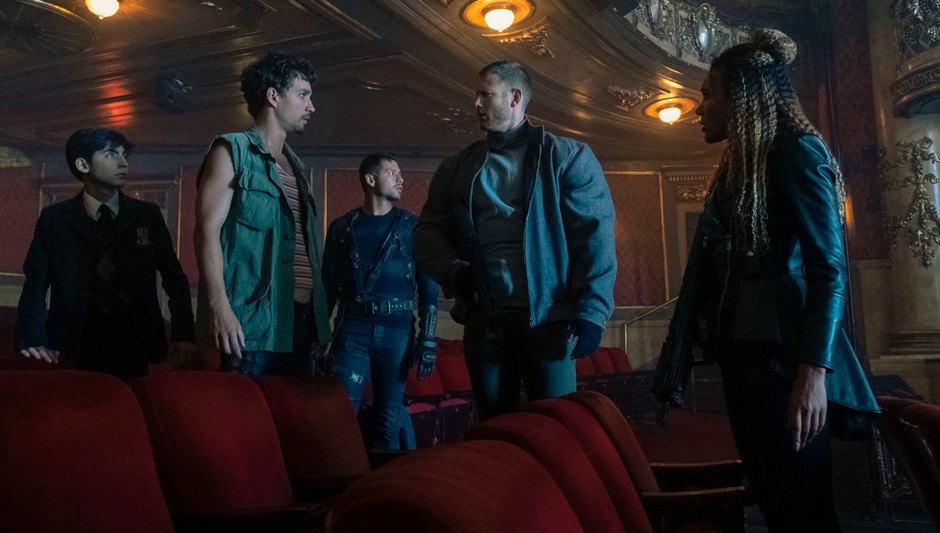
Back at the theatre, the siblings proceed to take on Vanya after fending off against the heavily armed soldiers, but not until they are attacked again inside the theatre, only as a malevolent Vanya continues playing her violin exuding white light, causing havoc. The siblings are able to overcome the soldiers once again but with a little help from conjuring up Ben through Klaus and physically manifesting his powers. Realising it was imperative to separate Vanya from her violin if they stood a chance, all siblings, Luther, Diego, Klaus and Five, except a mute Allison decide to come at her from all directions, with time running out fast as Vanya is reaching the crescendo of her piece, furthering the wave of destruction. Unsurprisingly, they are caught by Vanya and restrained and suspended mid-air through strings of energy originating from Vanya, now at the peak of her power, as we see Allison sneaking up on her from behind and shooting next to her ear, the deafening blow incapacitating her, as she falls to the ground, now adorning a white coat and a white violin, akin to her comic book counterpart.
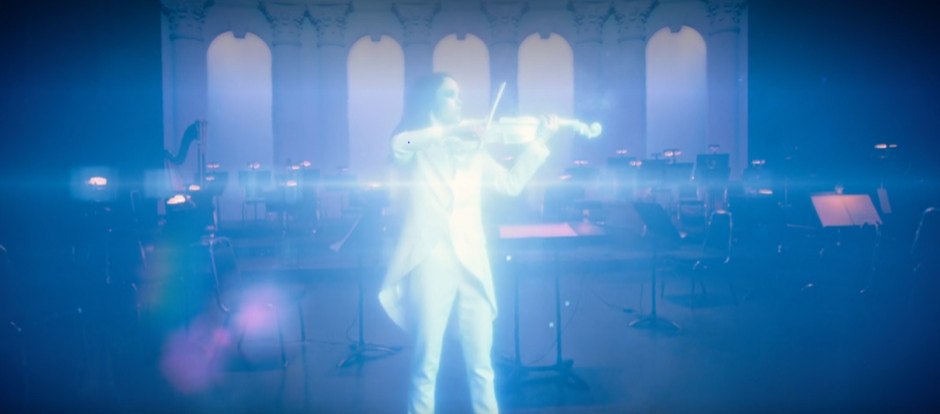
However, as Vanya falls, a concentrated beam of energy is let off upwards from her body, through the Icarus Theatre’s skylight, and to the surface of the moon. As the Moon is shown decomposing into fragments after the strike, sending projectiles and masses of rocks towards the Earth, the siblings along with an unconscious Vanya realise the futility of their short term efforts and the inevitability of the apocalypse. Realising that the end is nigh, the five stand with Vanya pondering over the failure of their efforts as ‘The Umbrella Academy’ and everything Reginald had thought of them, until Five comes up with a new plan in their final moments, even as the apocalypse is shown to consume the world.
The Ending
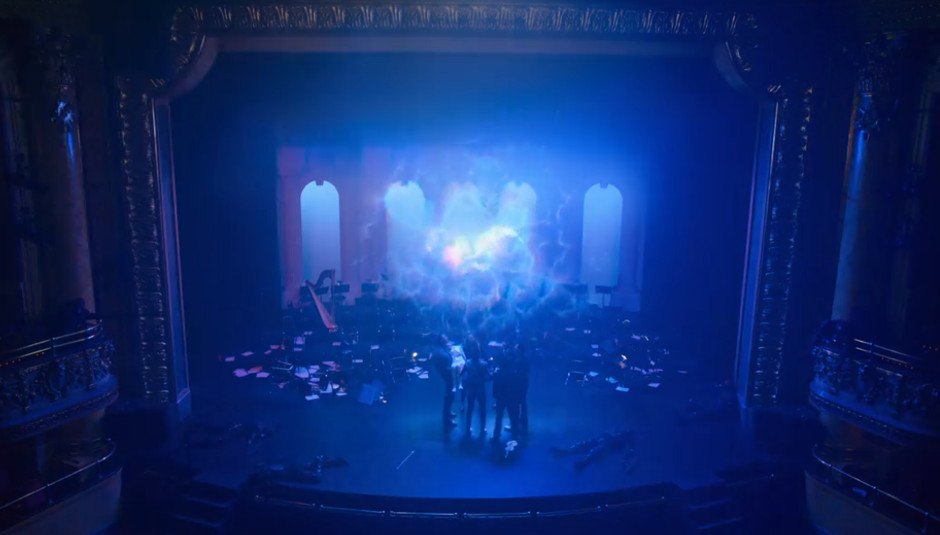
The ending of the show is the summative embodiment of one fundamental thing that I feel is wrong with modern TV shows. I simply fail to pinpoint as to where as an audience, and where as showrunners did we (or them) trade-off rewarding closures after hours of investment with frankly frustrating cliffhangers and unimaginably long waiting times for a conclusion. As much as I enjoyed the show, the fact that they chose to end the season on a cliffhanger note and not as a self-contained season by itself, especially given its longer than required running time, will forever continue to stick out for me like a sore thumb. However, given the way things are, neither is the trend going anywhere anytime soon, nor the explainers that follow.
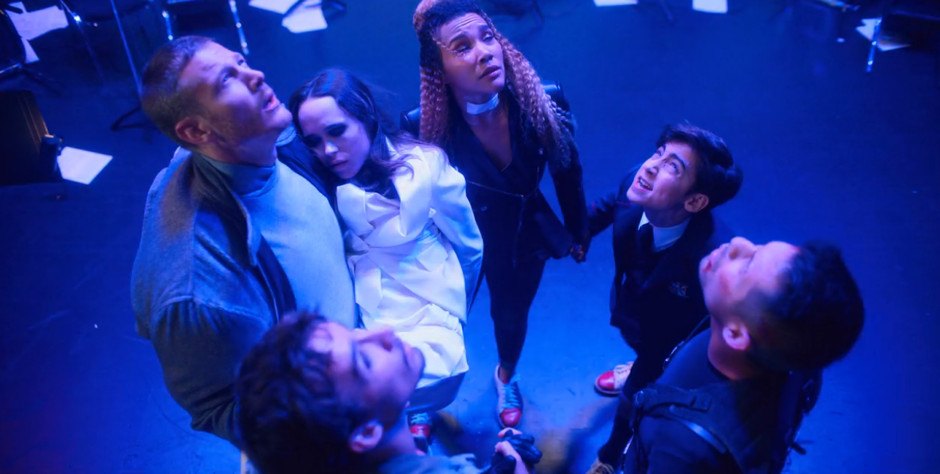
With apparent impending doom consuming the world as entire building blocks go down, Five proposes that he travel back in time with the others from Umbrella Academy, in an attempt to fix the problem at the very grass-root level. As is evident from the show, the physics behind this is complicated, since it was Five’s inability to travel back in time that proved to be tricky the last time around as well. However, after making his way back as his own consciousness trapped inside the body of his younger teenage self, it seems that the physics of that would have been all but worked out, and having warned others of similar consequences, Five initiates the process. As the group are in the process of apparating into the past with their present consciousness and as the wave of destruction from the impact of the lunar fragments on Earth spreads, we see Dt. Dale Chedder, Sgt. Chuck Beamen and Cha-Cha being consumed in the destruction, while Hazel and Agnes escape to an unknown time using the time travel briefcase the Handler brought along, with the rest of them destroyed by Five. As for the Umbrella Academy, we see Luther, Diego, Allison, Klaus, and Vanya transform into their younger teenage selves, while Five remains unaffected and Ben is resurrected. The original seven members of the academy then disparate as the destruction takes over the Icarus theatre and the screen cuts to black.
The Future: Season 2 Theories
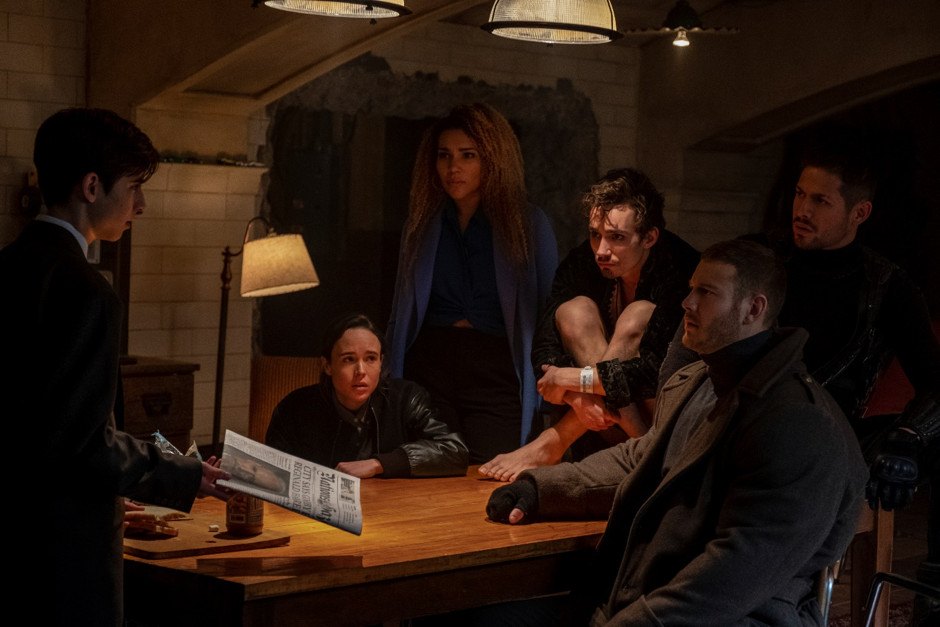
It is all but obvious that a second season would be coming, especially given the note things end on in the first season. Several bases, including Ben’s death, Reginald Hargreeve’s past, origins and time on his home planet, the Academy’s training, their disintegration, and several other things that were barely mentioned in the first season, would need to be covered in the second season, apart from the obvious culmination of the academy’s going back in time and saving the world storyline. Now, if you are closely following, “grassroot” as used in the previous section could have so many different meanings. How far back in time would Five travel with the others? “The apocalypse will always happen and Vanya will always be the cause, unless we take her with us and fix her”, he says. Now fully aware of the cause of the apocalypse being Vanya and her powers, the team could seek to neutralise Vanya before she becomes a threat, or go after the one that manipulated her into realising the extent of her powers, the medium, Harold Jenkins.
However, since the team travels to the past as adults trapped in their teenage bodies, this would seem a little far-fetched, while the more plausible act of being more inclusive towards Vanya and easing her transition into the discovery of her powers isn’t very ‘cinematic’ by its very nature. The twist here is that Vanya too would be traveling to the past with her current consciousness, one whose destructive capacity was unparalleled, and should keep things interesting. Five’s shenanigans for an onlooker as a kid indulging in mature talks, having drinks and still killing like a pro were season highlights, and the entire academy doing that, especially Klaus, should undoubtedly be a blast.
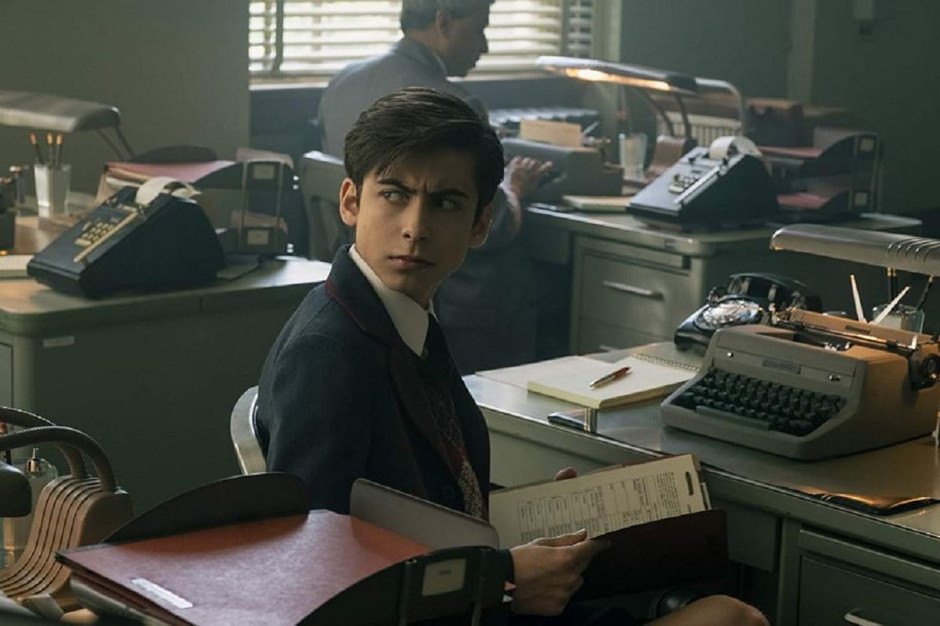
However, much of what we talk is speculation at this point of time. The one thing about which we may be sure of is that none of what we discussed above has enough fodder to last an entire, equivalent season. The first season drew most of its matter from the first series of Dark Horse comics of the same name, ‘The Umbrella Academy: Apocalypse Suite’, and some portions of the second series titled ‘The Umbrella Academy: Dallas’. While everything the first series dealt with has been, in essence, covered in the first season, ‘Dallas’ in particular deals with Five’s association with the temporal agency and his role in the assassination of JFK. As we may have it, this is potentially risky subject matter, so the makers might as well go with adapting part of the third series of comic books from ‘The Umbrella Academy’ titled ‘Hotel Oblivion’, still in production, that re-introduces a beloved villain for the franchise, Dr. Terminal, and features the academy battling a horde of villains they put off in prison as young crime fighters. Only this time, the prisoners were being held captive by Sir Reginald Hargreeves in Hotel Oblivion, ‘Arkham Asylum’ style. It should be all sorts of interesting to see or even predict the directions this franchise could take up and should take up. However, until season two is officially announced, there is a whole lot of waiting and a whole lot of speculating to do.
Final Word
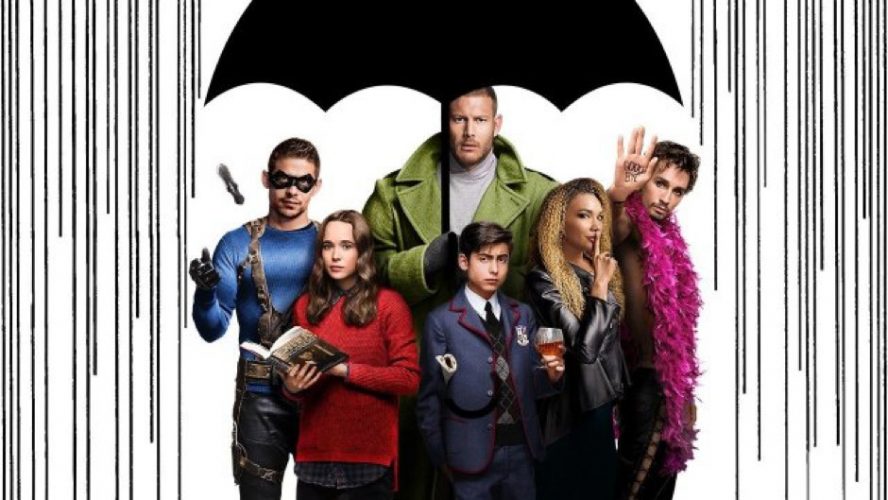
Before ending on a high note with a critical deconstruction of ‘The Umbrella Academy’, it is essential to point out what the show does differently from close to a hundred movies in this genre, and does them right. While some viewers may be put off by the elongated familial tension at the centre of the plot, I seemed to rather enjoy the years of history and hatred and secrets that brew and unravel over the course of ten episodes. The “coming together” for the end of the world is very characteristic of major tent-pole productions today, and although it doesn’t last long and occurs in the unlikeliest of fashions, it is the central familial drama, their camaraderie and the gradual unveiling of secrets and powers over the course of the series that makes it worthwhile. All of which, for the record, would have no consequence had the casting not been so spot on. Each of the actors, while not star performers, embody their parts functionally well and really seem to grow into their roles as the plot progresses. Equal credits to the writers for successfully adapting an oddball bunch of characters and making them individually and collectively likeable, with Robert Sheehan as Klaus being an absolute scene stealer.
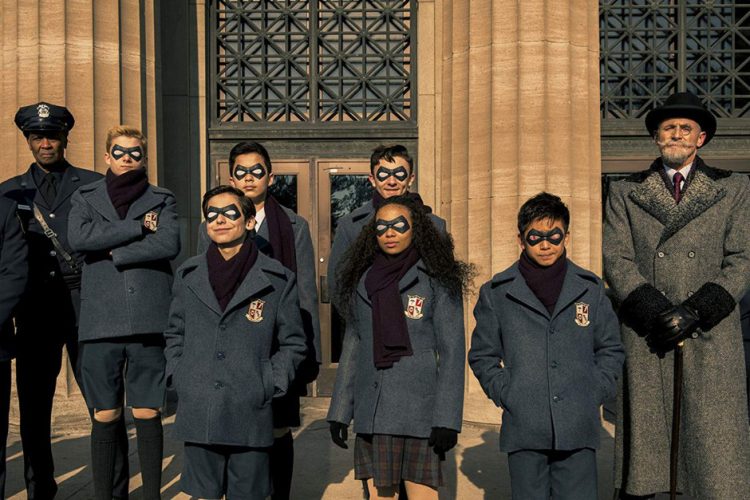
What’s more? The action scenes are well done, the CGI is decent except for a short bit in the finale, the cinematography is appealing with the wide angle doing wonders to the composition even in interior spaces, the time travel bits are well done too, and the actors play their parts well as the story and characters successfully keep you invested. However, almost every viewer would agree with me when I say that the single greatest take-off and stand-out from the show is its exceptional soundtrack, both originally composed for the background score including some terrific violin and violinic rock, and existing songs tastefully inserted into the narrative at almost every major conjuncture in the plot. The two most memorable ones include ‘Run Boy Run’ as Number Five runs to cross the time barrier and is successfully able to transport himself through time, before travelling too far into the future and finding everything destroyed in the wake of the apocalypse; the second one being ‘Don’t Stop Me Now’ by the legendary Queen played in the background of a store shootout, also starring Number Five along with Hazel and Cha-Cha.
All things said, despite the evidently stretched out narrative lavishly told over ten long episodes (I still believe this would have functioned better with eight episodes or so) and the occasional lapses and lingering in plot, ‘The Umbrella Academy’ on the strength of its fantastic premise and whimsical treatment makes for a better watch than many of the latest Netflix originals currently on offer. That this is based on a disjointed, dysfunctional group of superheroes unlikely banding together could earn nothing but brownie points from me.
Read More in Explainers: True Detective Season 3 | Dexter

